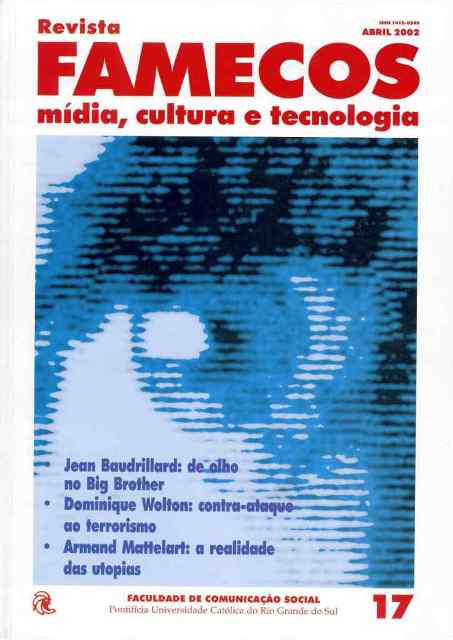Agenda-setting and framing: reaffirming the limited effects
DOI:
https://doi.org/10.15448/1980-3729.2002.17.3154Keywords:
Agenda-setting, Mass media, PowerAbstract
This article comments upon some critical studies which deny the limited effects of the mass media as held by the agendasetting hypothesis.Downloads
References
BARROS FILHO, Clóvis. Ética na comunicação: da informação ao receptor. São Paulo: Moderna, 1995.
BENNETT, W. L. News: the politics of illusion. Nova York: Longman, 1988.
BREGMAN, Dorine. La función de agenda: una problemática en transformación. In: FERRY, Jean-Marc et al. El nuevo espacio público. Barcelona: Gedisa, 1998.
BROSIUS, H.B.; KEPPLINGER, H. M. The agenda-setting function of television news: Static and dynamic views. Communication Research, 17, p. 183-211, 1990.
DAYAN, Daniel. Acerca de la teoria de los efectos limitados. In: FERRY, Jean-Marc et al. El nuevo espacio público. Barcelona: Gedisa, 1998.
FLEUR, Melvin L. de. Teorias de comunicação de massa. Rio de Janeiro: Zahar Editores, 1971.
ENTMAN, Robert M. Framing: toward clarification of a fractured paradigm. Journal of Communication, Oxford University, p. 1-8, 1993.
ENTMAN, Robert M. Framing U. S. Coverage of International News: Contrasts in Narratives of the KAL and Iran Air Incidents. Journal of Communication, Oxford University, 1991c.
ENTMAN, Robert M. Democracy without citizens – media and the decay or american politics. New York: Oxford University Press, 1989.
GAMSON, William A.; MODIGLIANI, Andre. Media discourse and public opinion on nuclear power: a cons-tructionist approach. American Journal of Sociology, University of Chicago, 1989.
GITLIN, Todd. The whole word is watching: mass media and the making and unmaking of the New Left. Berkeley, CA: University of California Press, 1980.
GOFFMANN, Erving. Frame analysis. Nova York: Harper y Row, 1974.
GUREVITCH, M; BLUMLER, J.G. Political communication systems and democratic values. In: LICHTENBERG, J (org.) Democracy and the mass media. Cambridge: Cambridge University Press, 1990. p. 269-289.
HACKETT, Robert A. Declínio de um paradigma? A parcialidade e a objectividade nos estudos dos media noticiosos. In: TRAQUINA, Nelson. Jornalismo, Questões, Teorias e “Estórias”. Lisboa: Vega, 1993.
HALLIN, Daniel C.; MANCINI, Paolo. Falando do presidente: a estrutura política e a forma representacional nas notícias televisivas dos Estados Unidos e da Itália. In: TRAQUINA, Nelson. Jornalismo, Questões, Teorias e “Estórias”. Lisboa: Vega, 1993.
HALL, Stuart et al. A produção social das notícias: o mugging nos media. In: TRAQUINA, Nelson. Jornalismo, Questões, Teorias e “Estórias”. Lisboa: Vega, 1993.
HERMAN, Edward S. A diversidade de notícias: ʻmarginalizandoʼ a oposição. In: TRAQUINA, Nelson. Jornalismo, Questões, Teorias e “Estórias”. Lisboa: Vega, 1993.
HOHLFELDT, Antonio. Os estudos sobre a hipótese do agendamento. Revista Famecos, Porto Alegre, PUCRS, n. 7, 1997.
KATZ, Elihu. La investigación en la comunicación desde Lazarsfeld. In: FERRY, Jean-Marc et al. El nuevo espacio público. Barcelona: Gedisa, 1998.
LASSWELL, Harold . A estrutura e a função da comunicação na sociedade. In: COHN, Gabriel (org.). Comunicação e indústria cultural. São Paulo: Nacional, 1971. p. 105-117.
LAZARSFELD, Paul; MERTON, Robert. Comunicação de massa, gosto popular e ação social organizada. In: COHN, Gabriel (org.). Comunicação e indústria cultural. São Paulo: Nacional, 1971. p. 230-253.
LIPOVETSKY, Gilles. O império do efêmero. São Paulo: Companhia das Letras, 1989
MATTELART, Armand e Michèle. História das teorias da comunicação. São Paulo: Loyola, 1999.
McCOMBS, Maxwell. Influencia de las noticias sobre nuestras imágenes del mundo. In: BRYANT, Jennings; ZILLMANN, Dolf. Los efectos de los medios de comunicación. Investigaciones y teorias. Barcelona: Paidós, 1996.
McCOMBS, Maxwell E. The evolution of agenda-setting research: twenty-five years in the marketplace of ideas. Journal of Communication, v. 43, n. 2, Spring, 1993.
McCOMBS, Maxwell E.; SHAW, Donald L. The agendasetting
function of mass media. Public Opinion Quarterly, v. 36, n. 2, Summer, p. 176-187, 1972.
McLEOD, Jack M.; KOSICKI, Gerald M.; McLEOD, Douglas M. Expansión de los efectos de comunicación política. In: BRYANT, Jennings; ZILLMANN, Dolf. Los efectos de los medios de comunicación. Investigaciones e teorías. Barcelona: Paidós, 1996.
NOELLE-NEUMANN, Elisabeth. La espiral del silencio. Opinión pública: nuestra piel social. Barcelona: Paidós, 1995.
ROGERS, Everett M. The anatomy of agenda-setting research. Journal of Communication, v. 43, n. 2, 1993.
BLANCO, Víctor Sampedro. Efectos de los medios de comunicación sobre la opinión pública. Los paradigmas sobre el poder del público. [s/d].
BLANCO, Victor Sampedro. Movimientos sociales: debates sin mordaza. Desobediencia civil servicio militar (1970-1996). Madrid: Centro de Estudios Constitucionales, 1997.
SHAW, Donald L.; McCOMBS, Maxwell E. The emergence of american political issues: The agenda-setting function of the press. Saint Paul, Minnesotta, West Publishing Co., s/d.
TRAQUINA, Nelson. O paradigma do agenda-setting: Redescoberta do poder do jornalismo. Revista Comunicação e Linguagens, Lisboa, n. 21 e 22, Cosmos, 1995.
WOLF, Mauro. Teorias da comunicação. Lisboa: Presença, 1986.
Downloads
Published
How to Cite
Issue
Section
License
Copyright
The submission of originals to Revista Famecos implies the transfer by the authors of the right for publication. Authors retain copyright and grant the journal right of first publication. If the authors wish to include the same data into another publication, they must cite Revista Famecos as the site of original publication.
Creative Commons License
Except where otherwise specified, material published in this journal is licensed under a Creative Commons Attribution 4.0 International license, which allows unrestricted use, distribution and reproduction in any medium, provided the original publication is correctly cited.






